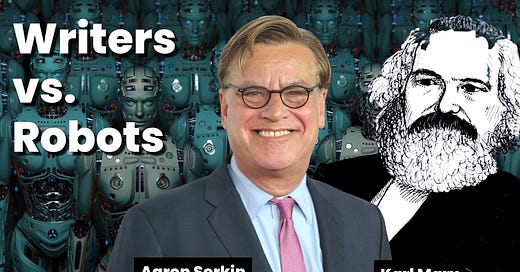Writers Versus Robots
Everything’s a battle. No platform, no streamer, no cable company, wakes up in the morning and says “We are all good.” They wake up in fear -- fear of changing audience appetites, of new devices, of the demands of investors in the stock market.
Meanwhile, writers find themselves in the unenviable position of being at the crossroads of rapidly evolving technology, and deeply fearful employers.
It’s always been a battle. Just ask Karl Marx, as factory owners set out to maximize profits while workers looked to increase their share of the economic pie.
So, with AI amplifying inequity, now seemed like the right time to speak with Mr. Marx. And we wanted him to have a skilled adversary, so we summoned writer and Writers Guild of America protagonist Aaron Sorkin.
Call it a debate, call it a grudge match. It’s game on!
Moderator: Welcome to tonight's debate. Our topic is the arrival of AI for screenwriters, and we have two distinguished guests here to share their thoughts. Representing the screenwriter's perspective is Karl Marx, and arguing the opposing view is Aaron Sorkin. Karl, let's start with you. How do you see the arrival of AI impacting the screenwriting industry?
Karl Marx: Thank you for having me here tonight. As someone who has long advocated for the rights of workers, I believe that the arrival of AI for screenwriters represents a potential threat to the livelihoods of human screenwriters. The use of AI could lead to the displacement of human workers, leaving them without jobs and without a means to support themselves and their families.
Aaron Sorkin: Respectfully, I must disagree. As someone who has dedicated his life to the art of screenwriting, I see AI as a tool that can enhance and supplement human creativity, rather than replace it. AI can be used to generate ideas, refine dialogue, and speed up the writing process, freeing up human writers to focus on the more creative aspects of their work.
Karl Marx: I understand your point of view, Aaron, but I fear that the use of AI in screenwriting could ultimately lead to a widening gap between the haves and the have-nots. If AI becomes the dominant force in the industry, it will likely be controlled by a small group of wealthy elites who own and control the technology. This would further consolidate power and wealth in the hands of a few, at the expense of the many.
Aaron Sorkin: I see your concerns, Karl, but I believe that AI has the potential to democratize the screenwriting process, making it more accessible to a wider range of people. AI can be used to help new writers refine their craft and generate ideas, giving them a foothold in the industry that they might not otherwise have. Furthermore, the use of AI could make the screenwriting process more efficient, allowing for more projects to be produced and more writers to be employed.
Karl Marx: While I appreciate your optimism, Aaron, I believe that the use of AI in screenwriting is just another example of the exploitation of workers by the ruling class. The technology may
make the process more efficient, but at what cost? If human writers are replaced by machines, we risk losing the creativity, intuition, and emotional depth that make screenwriting a truly human art form.
Aaron Sorkin: I understand your concerns, Karl, but I believe that the use of AI can actually enhance the emotional depth of screenwriting. AI can be used to analyze and understand human emotion, allowing for more nuanced and authentic character development. Furthermore, the use of AI can free up human writers to focus on the more complex and creative aspects of their work, allowing them to produce even richer and more engaging stories.
Moderator: Thank you, Karl and Aaron, for your insightful perspectives on this important issue. It’s clear the arrival of AI for screenwriting raises many important concerns, but also holds great promise for the future of the industry.
So, Marx or Sorkin: Which side do you end up on? And for transparency, we spoke to neither Marx nor Sorkin. Marx is dead, but very much alive in literature. Sorkin is very much alive, but we didn’t have his email address. But his feelings about the union position are in the public record.
Oh, and we did engage ChatGPT to stage the debate, so if there are flaws in the logic, blame the robot. If the debate seems topical and relevant, I -- as the human -- am happy to take the credit. Welcome to the world of robots and writers.




